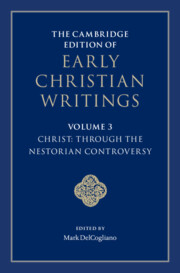Book contents
- The Cambridge Edition of Early Christian Writings
- The Cambridge Edition of Early Christian Writings
- The Cambridge Edition of Early Christian Writings
- Copyright page
- Contents
- Notes on Contributors
- Acknowledgments
- Note on the Texts and Translations
- Abbreviations
- Series Introduction
- Introduction
- Part I The Beginnings of Christology
- Part II Developing Christological Traditions
- Part III Traditions of Pro-Nicene Christology
- Part IV Controversy over Nestorius
- 40 Eusebius of Dorylaeum, Protest
- 41 Cyril of Alexandria, Second Letter to Nestorius
- 42 Nestorius of Constantinople, Second Letter to Cyril
- 43 Proclus of Constantinople, Homily on the Holy Virgin Theotokos
- 44 Nestorius of Constantinople, Three Letters to Celestine of Rome
- 45 John Cassian, On the Incarnation of the Lord against Nestorius 3.1–16 and 5.1–4
- 46 Cyril of Alexandria, Third Letter to Nestorius
- 47 Nestorius of Constantinople, Letter to John of Antioch
- 48 Theodoret of Cyrrhus, Refutation of the Twelve Anathemas of Cyril of Alexandria
- 49 Acts of the Council of Ephesus ( June–October 431): Selected Proceedings
- 50 Cyril of Alexandria, Letter of Reunion to John of Antioch
- 51 Ibas of Edessa, Letter to Mari the Persian
- 52 Cyril of Alexandria, First Letter to Succensus
- 53 Cyril of Alexandria, Second Letter to Succensus
- 54 Theodoret of Cyrrhus, Eranistes: Epilogue
- Suggestions for Further Reading
- Scriptural Index
50 - Cyril of Alexandria, Letter of Reunion to John of Antioch
from Part IV - Controversy over Nestorius
Published online by Cambridge University Press: 05 February 2022
- The Cambridge Edition of Early Christian Writings
- The Cambridge Edition of Early Christian Writings
- The Cambridge Edition of Early Christian Writings
- Copyright page
- Contents
- Notes on Contributors
- Acknowledgments
- Note on the Texts and Translations
- Abbreviations
- Series Introduction
- Introduction
- Part I The Beginnings of Christology
- Part II Developing Christological Traditions
- Part III Traditions of Pro-Nicene Christology
- Part IV Controversy over Nestorius
- 40 Eusebius of Dorylaeum, Protest
- 41 Cyril of Alexandria, Second Letter to Nestorius
- 42 Nestorius of Constantinople, Second Letter to Cyril
- 43 Proclus of Constantinople, Homily on the Holy Virgin Theotokos
- 44 Nestorius of Constantinople, Three Letters to Celestine of Rome
- 45 John Cassian, On the Incarnation of the Lord against Nestorius 3.1–16 and 5.1–4
- 46 Cyril of Alexandria, Third Letter to Nestorius
- 47 Nestorius of Constantinople, Letter to John of Antioch
- 48 Theodoret of Cyrrhus, Refutation of the Twelve Anathemas of Cyril of Alexandria
- 49 Acts of the Council of Ephesus ( June–October 431): Selected Proceedings
- 50 Cyril of Alexandria, Letter of Reunion to John of Antioch
- 51 Ibas of Edessa, Letter to Mari the Persian
- 52 Cyril of Alexandria, First Letter to Succensus
- 53 Cyril of Alexandria, Second Letter to Succensus
- 54 Theodoret of Cyrrhus, Eranistes: Epilogue
- Suggestions for Further Reading
- Scriptural Index
Summary
The two rival parties that met in Ephesus in July 431, one led by Cyril and his allies and the other by Nestorius and John of Antioch, failed to reach an accord and instead each condemned the legitimacy of the other. Emperor Theodosius II then intervened by arranging for a smaller group of representatives from each side to have a series of meetings in Chalcedon under his personal supervision. With Cyril under house arrest in Ephesus and Nestorius deposed and sent into exile, it was hoped that the two sides could achieve reconciliation. Some of the Easterners (so called because they came from the Roman diocese of Oriens or “East”), including John of Antioch himself, were willing to agree to Nestorius’s excommunication, but they continued to hold that Cyril’s Twelve Anathemas (also called the Twelve Chapters) appended to his Third Letter to Nestorius were tainted with heresy (especially Apollinarianism) and so insisted that they too had to be condemned. As these negotiations stretched into October, it became evident that a resolution would not be achieved in the short term, so Theodosius finally released all the bishops to disperse to their sees, including Cyril who had already departed for Alexandria.
- Type
- Chapter
- Information
- The Cambridge Edition of Early Christian Writings , pp. 718 - 725Publisher: Cambridge University PressPrint publication year: 2022

